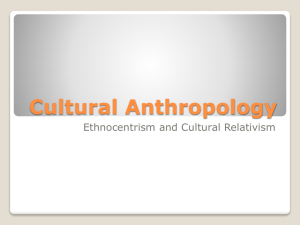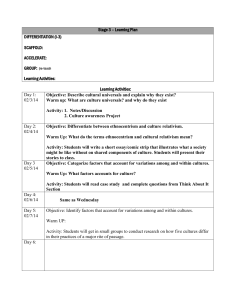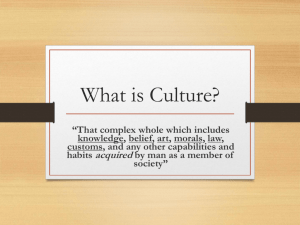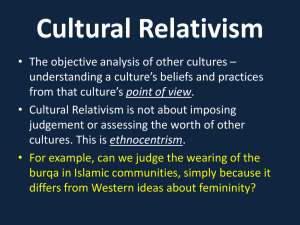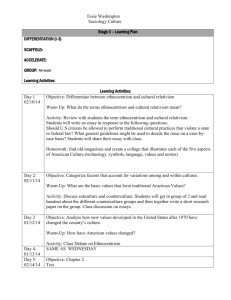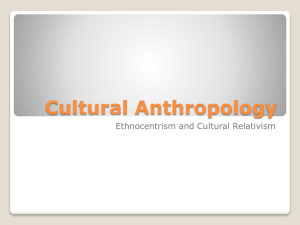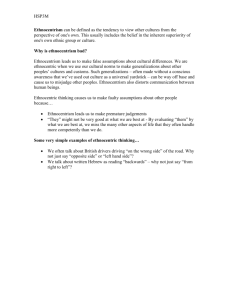Ethnocentrism, Cultural Relativism & Human Rights Presentation
advertisement
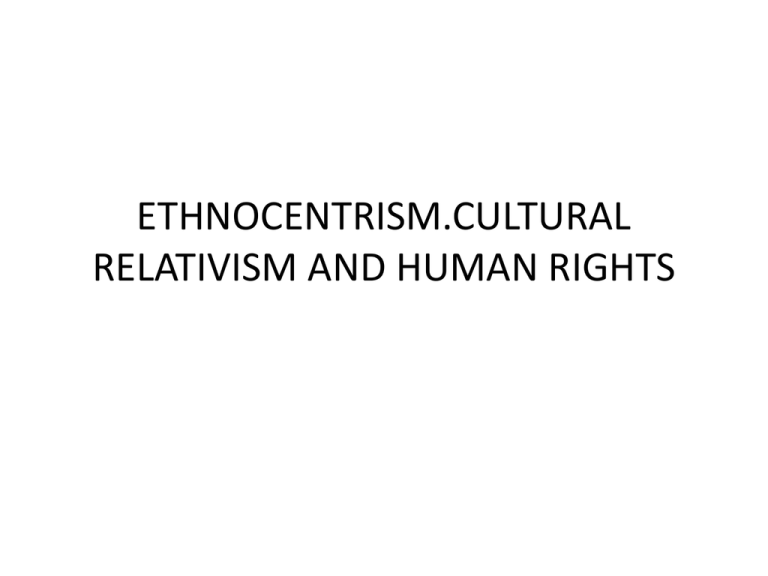
ETHNOCENTRISM.CULTURAL RELATIVISM AND HUMAN RIGHTS ETHNOCENTRISM • Definition • The tendency to view one’s own culture as superior and apply one’s own cultural values to judging the behavior and beliefs of people raised in other cultures • Everybody is a little ethnocentric • We hear ethnocentric statements all the time PATRIOTISM VS ETHNOCENTRISM • Patriotism is love of one’s culture. • Can be patriotic without being ethnocentric ETHNOCENTRIC IF • You judge the behavior and beliefs of people who are different from you • You believe that there are primitive cultures, especially if their life ways are different than your own • You believe that some cultures are backward if they lack the technology and consumerism of your own culture NOT TRUE • No such thing as primitive or backward cultures. All cultures provide their members with the means for meeting all human needs. • Ethnocentrism has to be taught. You have to be taught that your culture is superior and all other cultures are inferior • Stop ethnocentric behavior you must stop judging others who are different from you CHARACTERISTICS OF ETHNOCENTRISM • Contributes to Social Solidarity, a sense of value and community among people who share a cultural tradition • People everywhere think that the familiar expectations, and their opinions and customs are right, true, proper, natural and moral • Regard different behavior as strange, unnatural, immoral and savage THINK • Can you think of examples of ethnocentrism you have encountered? • What is your opinion of Iran and Iranians? • In Trans-Fly region of Papua New Guinea, homosexuality is values over heterosexuality • Men of the Etoro tribe favor homosexuality while their neighbors encourage men to engage in anal sex. OPPOSING ETHNOCENTRISM • Cultural Relativism is a viewpoint&position • That behavior in one culture should not be judged by the standards of another culture, i.e., values and standards of one’s own culture • That the values and standards of culture differ and deserve respect HUMAN RIGHTS • Challenge some aspects of Cultural Relativism • Some cultures in Africa and Middle East practice female genital modification • CLITORIDECTOMY is the removal of the clitoris& INFIBULATION involves the sewing of the lips of the vagina. • Both procedures reduce female sexual pleasure & is a way that men control female sexuality Why? • Cultures are male dominate and patrilineal. • Property, resources and wealth passed from father to sons • Need to assure father that son is of father’s bloodline • Fear of the likelihood of female adultery HUMAN RIGHTS ADVOCATES • Oppose such practices • Such practices infringe on basic human right— control over one’s body and one’s sexuality • Some African nations have banned such practices • What about infant male circumcision? • Distinguish between moral and methodological relativism METHODOLOGICAL RELATIVISM • In anthropology, cultural relativism is not a moral position but a methodological position • To understand another culture fully, you must try to see how the people in that culture see things • What motivates them—what are they thinking—when they do those things? METHODOLOGICAL RELATIVISM IS A STANCE • Cultural Relativism as Methodological relativism does not preclude making a moral judgment or taking action • When faced with Nazi atrocities, a cultural/methodological relativist would have a moral obligation to stop being an anthropologist and take action to intervene HUMAN RIGHTS AND CULTURAL RIGHTS • Human rights invokes a realm of justice and morality that is beyond and superior to the laws and customs of particular countries • Unlike Human Rights Cultural Rights are vested not in individuals but in groups, such as religious and ethnic minorities and in indigenous societies • CR include the right to preserve its culture, to raise its children in their cultural traditions, to continue its language and have economic rights POSSIBLE CONFLICTS • Idea of cultural rights is related to the idea of cultural relativism • What does one do about cultural rights that interfere with human rights? • Anthropologist main task is to understand another culture • Anthropologist does not have to approve its practices WHAT DO YOU THINK? • Most ethnographers(anthropologist who do fieldwork) strive to be objective, accurate and sensitive in their studies of other cultures. • However, objectivity, sensitivity and a crosscultural perspective don’t mean that anthropologists have to ignore international standards of justice and morality • What do you think?

